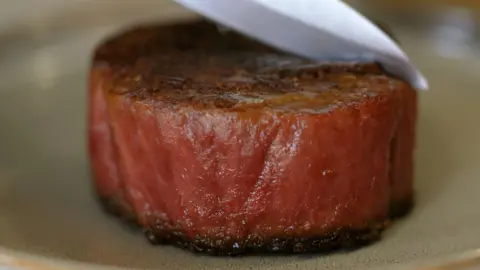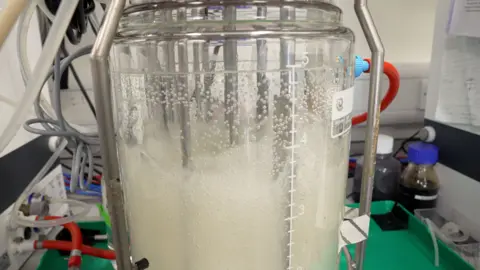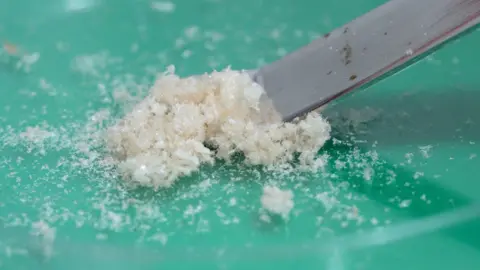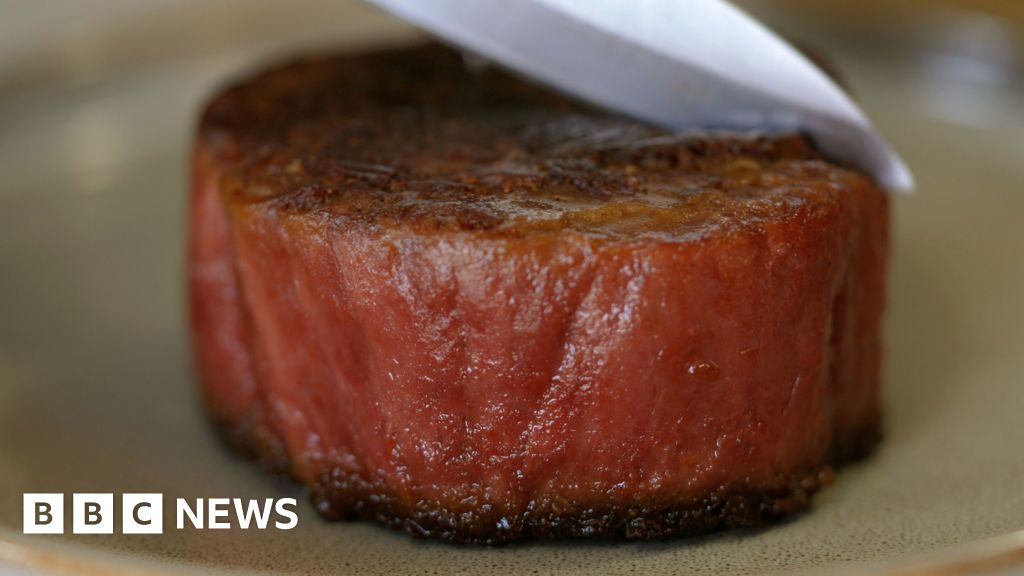
 BBC
BBCMeat, dairy and sugar grown in a lab could be on sale in the UK for human consumption for the first time within two years from now, sooner than expected.
The Food Standards Agency (FSA) is looking at how it can speed up the approval process for lab-grown foods.
Such products are grown from cells in small chemical plants.
UK firms have led the way in the field scientifically but feel they have been held back by the current regulations.
Dog food made from meat that was grown in factory vats went on sale in the UK for the first time last month.
In 2020, Singapore became the first country to authorise the sale of cell-cultivated meat for human consumption, followed by the United States three years later and Israel last year.
However, Italy and the US states of Alabama and Florida have instituted bans.
The FSA is to develop new regulations by working with experts from high-tech food firms and academic researchers.
It says it aims to complete the full safety assessment of two lab-grown foods within the two-year process it is starting.
But critics say that having the firms involved in drawing up the new rules represents a conflict of interest.
The initiative is in response to concerns by UK firms that they are losing ground to competition overseas, where approvals processes take half the time.
Prof Robin May, the FSA’s chief scientist, told BBC News that there would be no compromise on consumer safety.
“We are working very closely with the companies involved and academic groups to work together to design a regulatory structure that is good for them, but at all costs ensures the safety of these products remains as high as it possibly can,” he said.
But critics such as Pat Thomas, director of the campaign group Beyond GM, are not convinced by this approach.
“The companies involved in helping the FSA to draw up these regulations are the ones most likely to benefit from deregulation and if this were any other type of food product, we would be outraged by it,” she said.
 BBC News
BBC NewsThe science minister, Lord Vallance, took issue with the process being described as “deregulation”.
“It is not deregulation, it is pro-innovation regulation,” he told BBC News.
“It is an important distinction, because we are trying to get the regulation aligned with the needs of innovation and reduce some of the bureaucracy and duplication.”
Lab-grown foods are grown into plant or animal tissue from tiny cells. This can sometimes involve gene editing to tweak the food’s properties. The claimed benefits are that they are better for the environment and potentially healthier.
The government is keen for lab-grown food firms to thrive because it hopes they can create new jobs and economic growth.
The UK is good at the science, but the current approvals process is much slower than in other countries. Singapore, the US and Israel in particular have faster procedures.
Ivy Farm Technologies in Oxford is ready to go with lab-grown steaks, made from cells taken from Wagyu and Aberdeen Angus cows.
The firm applied for approval to sell its steaks to restaurants at the beginning of last year. Ivy Farm’s CEO, Dr Harsh Amin, explained that two years was a very long time to wait.
“If we can shorten that to less than a year, while maintaining the very highest of Britain’s food safety standards, that would help start-up companies like ours to thrive.”

Dr Alicia Graham has a similar story. Working at Imperial College’s Bezos centre in west London, she has found a way to grow an alternative to sugar. It involves introducing a gene found in a berry into yeast. This process enables her to produce large amounts of the crystals that make it taste sweet.
It doesn’t make you fat, she says, and so is a potential sweetener and healthy substitute in fizzy drinks.
In this case I am allowed to taste it. It was incredibly sweet and slightly sour and fruity, reminding me of lemon sherbet. But Dr Graham’s firm, MadeSweetly, is not allowed to sell it until it gets approval.
“The path to getting approval is not straightforward,” she tells me.
“They are all new technologies, which are not easy for the regulator to keep up with. But that means that we don’t have one specific route to product approval, and that is what we would like.”
The FSA says it will complete a full safety assessment of two lab-grown foods within the next two years and have the beginnings of a faster and better system for applications for approvals of new lab-grown foods.
Prof May of the FSA says the purpose of working with experts from the companies involved as well as academics is to get the science right.
“It can be quite complex, and it is critical that we understand the science to make sure the foods are safe before authorising them.”
But Ms Thomas says that these high-tech foods may not be as environmentally friendly as they are made out to be as it takes energy to make them and that in some cases their health benefits are being oversold.
“Lab-grown foods are ultimately ultra-processed foods and we are in an era where we are trying to get people to eat fewer ultra-processed foods because they have health implications,” he said.
“And it is worth saying that these ultra-processed foods have not been in the human diet before.”



